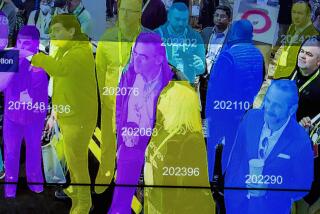The Password Is Fraud: TV Show Champ Arrested : He Came to Pick Up Winnings, Got Picked Up on Old Warrants
- Share via
Kerry Ketchem went to pick up a $58,000 check Thursday as the largest one-game winner in the history of TV’s “Super Password” game show but instead ended up as a prize catch for two federal agents who picked him up on outstanding fraud charges.
The man who breezed to victory on the show by guessing words such as “phony” is wanted on charges in Indiana, is under investigation for credit card fraud in Alaska and is the target of a separate FBI investigation, according to Secret Service Agent Ron Williams, who helped capture Ketchem after a short chase.
Ketchem, 36, made four appearances on “Password” earlier this month under the alias Patrick Quinn and came to the attention of authorities when a viewer in Anchorage recognized him as a fugitive from the credit card investigation.
Not So Smart
Despite his success on the game show--in which contestants are challenged to guess words after being given a series of one-word clues--Ketchem’s captors questioned his street smarts.
“I’m not sure how clever he is if he went on nationwide television after committing a fraud,” Williams said.
Ketchem is being held in the Los Angeles Police Department lockup pending extradition to Indiana to face charges there that he bought a BMW under a false name using false identification.
He just “drove away with it,” said Williams. “It was recovered in North Pole, Alaska.”
It was in Alaska that Ketchem, using the name Patrick Quinn that he later used on “Password,” allegedly ran up $25,000 on credit cards that were fraudulently obtained, according to Williams. The Secret Service is investigating those charges under a federal statute that gives the agency jurisdiction over credit card fraud.
History of Trouble
Ketchem apparently had a history of legal troubles, Williams said. He was once a sheriff’s deputy somewhere in Ohio but was fired for stealing from the evidence room, according to Williams.
“It took real chutzpah for somebody on the lam to make an appearance on a national network show,” said Jerry Chester, executive vice president of Mark Goodson Productions in New York.
“He went through the screening process like everybody else,” said Robert Sherman, executive producer of the show, who remembers the bearded Ketchem as “interesting, a colorful character.”
Ketchem told “Password” officials that he operated a “listening post” for the government in Alaska. During one commercial break on the show, Sherman said, host Bert Convy commented to Ketchem that a listening post sounds like CIA work.
“He said, ‘That’s right, it is,’ ” Sherman recalled. “We were very surprised that anyone in the CIA would admit it.”
Ketchem called the studio earlier this week and asked for expedited payment of his winnings because “he said he was leaving the country to operate a listening post in Turkey and would be gone six to 18 months,” Sherman said.
Agents Waiting
But the production company had already been contacted by the Secret Service and arrangements were made for authorities to capture Ketchem when he arrived at their offices on Sunset Boulevard, Sherman said.
“I need the $58,000 to pay for a lawyer,” Sherman said Ketchem declared when he arrived Thursday morning. But he never got the check.
“Being an ex-law enforcement type, he probably smelled (the agents) and ran,” Williams said, adding that the agents “temporarily lost him, then went back through the building and found him standing on top of a toilet” in a men’s restroom.
Now Ketchem may never get his payoff.
Mark Goodson Productions officials say that because he fraudulently represented his identity, he should not be paid. NBC officials, who make the final determination, said they may be legally required to award the prize money anyway.
Despite the alleged flimflams, Ketchem apparently won the game on his own merit. “None of us saw anything to indicate unfairness,” said Sherman of the NBC and production company monitors who watch the game for possible cheating by contestants. Still, officials are now “reviewing the tapes,” Sherman said.
More to Read
Sign up for Essential California
The most important California stories and recommendations in your inbox every morning.
You may occasionally receive promotional content from the Los Angeles Times.












